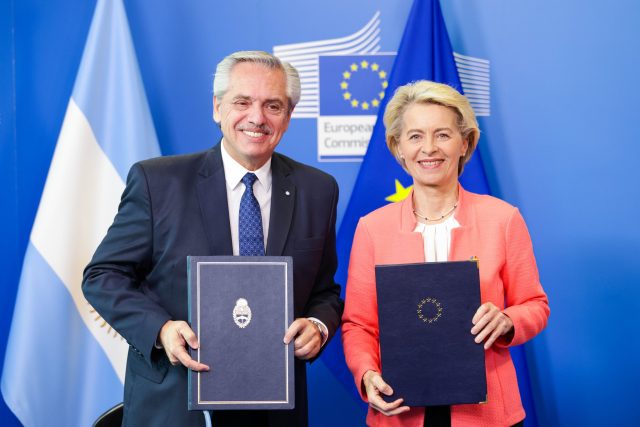
Brussels received the leaders of more than 50 nations for the third-ever Summit between the European Union and the Community of Latin American and Caribbean States (CELAC). As part of the Global Gateway initiative, the European Union looks to strengthen bonds with the Latin American and Caribbean region, after almost a decade of not meeting face-to-face.
An issue both blocs currently face is the energy crisis. This was a key item in the agenda of some of the largest countries of the CELAC and certainly of the European Commission.
During the summit, Argentinian President Alberto Fernández and European Commission President Ursula Von der Leyen took “a further step.” Accompanied by the Commissioner for Energy of the Community Executive, Kadri Simson, and the Argentine Foreign Minister, Santiago Cafiero, the presidents signed a Memorandum of Understanding (MOU) on energy cooperation.
Both parties commit to cooperating on issues to boost renewable energy, develop the hydrogen industry as a reliable source of energy, reduce methane leakage in the supply chain as much as possible, and develop a ‘socially just’ ecological transition.
In Von der Leyen’s words, “Europe and Argentina are partnering for a more secure, sustainable, and prosperous world.” She added that the MOU “will help us achieve our objectives on climate and energy.”
Both parties aim to continue meeting the energy demand of both of their populations. The MOU deepens cooperation in the development of new technologies and provides standards of best practices, and knowledge sharing on the reduction of greenhouse gas emissions and the decarbonization of natural gas.
The MOU also notes the need to ensure that future investments in promising projects and activities comply with the relevant environmental legislation of both parties. Presidents Fernández and Von der Leyen stressed the need to take into account concerns about biodiversity degradation, in addition to ensuring the protection, conservation, and restoration of water systems and water-related ecosystems.
This week the European Parliament voted in favor of the Nature Restoration Law, which has an energy component. ECR MEPs voted against this initiative, for it might reduce Europe’s energy output.
Nevertheless, both the European Union and Argentina are set to benefit from the recent agreement. On the one hand, Argentina has long wanted to become a reliable supplier of energy to contribute to the energy transition, thus increasing its exports.
For its part, the European Union has shown great interest in negotiating this agreement. The MOU will allow the European bloc to compensate for the supply issues caused by the global energy crisis and the war in Ukraine.
This new tool also hopes to advance cooperation between private companies in Argentina and the EU.
The European Commission added that “the EU and Argentina will work together to develop and promote renewable energy and energy efficiency, as well as the use of hydrogen and its derivatives in applications, such as industrial processes, transportation, and energy storage.” It is worth noting that the MOU also includes provisions that would bring Argentinian liquified natural gas (LNG) to European shores to meet the continent’s energy demand.
This is one of the agreements included in the EU-LAC Global Gateway Investment Agenda (GGIA). GCIA was presented on Monday at the business forum parallel to the EU-CELAC summit.
Under the GCIA umbrella, the European Union has committed to invest 45,000 million euros in energy and climate initiatives carried out on the other side of the Atlantic. This geopolitical instrument hopes to integrate “reliable” partners into the European sphere of influence and away from Chinese dependence.
To monitor the proper implementation of the objectives, Argentina and the European Union have established yearly high-level meetings and periodic ministerial-level meetings to address strategic issues, including the energy transition.



 Subscribe
Subscribe